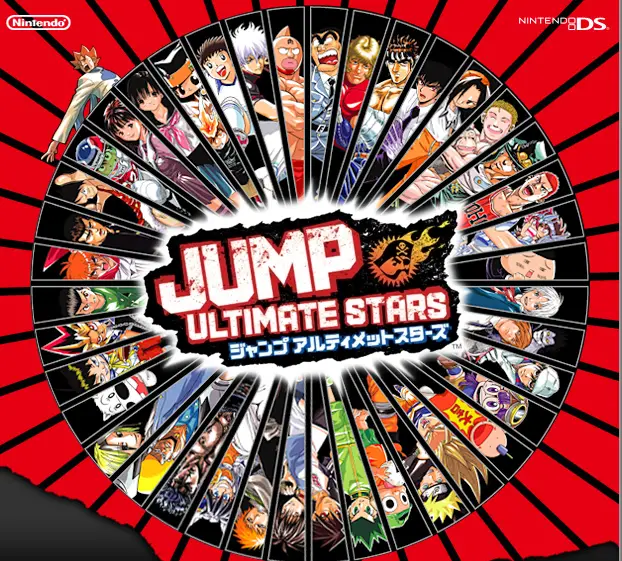プロフエッサーX/Professor X
This katakana word is a loanword from the english show X Men. This is a poster for the Japanese anime version of X Men. This is especially interesting since this show is borrowed from America yet a Japanese spin is put on it. Also this version has even added an additional character, 市木久子, her name is in Kanji but everyone else is in Katakana. I believe that this serves a special purpose in that Japanese viewers of the show will be able to directly identify with her and retain a sense of pride in their nationality. Also with the use of Professor X. The Japanese already have a word for Professor but probably choose to retain the English word in Katakana that way they preserve the popularity of X men.
ジャンプアルテイメットスターズ/Jump Ultimate Stars
Strangely enough this katakana comes from putting together a whole lot of Japanese characters into one game. This game isn't planned on being released in the US because of the licensing issues between the many characters in the game. It is strange to me why they use katakana. I think it is to preserve the brand name of Jump (from Shonen Jump). I think Katakana serves here to create a clear and cohesive title. The developers probably prefer "Jump Ultimate Stars" to "Great Stars that can jump."
The different books describe katakana in different ways because after the more obvious reasons, onomatopoeia and loanwords, it is difficult to tell exactly why. In the Jump Ultimate Stars example it is difficult to tell precisely why they would use katakana over anything else. Since this is ambitious it is hard to tell why they would use it over anything else, but it is definitely nice to have a written style devoted wholly to this concept.


よくがんばったね。 I think it is very interesting that the Japanese X-Men series added in a Japanese character. I was a little confused by your comment about the ジャンプアルテイメットスターズ though. Doesn't the title come from the name of the magazine, not from the actual action of "jumping"? I also wasn't quite sure what you meant by "ambitious". In any case, best of luck with the rest of your project!
ReplyDeleteWhenever an American show is adapted for a Japanese audience or vice versa it always quite confusing how the character's names are handled. I think it's a bit odd that they added a character just for the Japanese version, but it's kind of cool that her name is the only one that can be written in Kanji. とてもおもしろいですね。
ReplyDeleteジャンプアルテイメットスターズがほしいです。でも、ライサンシングがふくざつです。ジャンプアルテイメットスターズはブランドなまえです。そのかたかながちょっとながいです。ろまじのワードのほうがかたかなのワードよりだとおもいます。
It's definitely funny that they added a character catering to the intended audience despite its obvious ported nature. I wonder what powers she's given...?
ReplyDeleteI suspect that using カタカナ in a loanword setting has connotations of foreign/exotic origins. That is, by directly converting all the character names to カタカナ, the series might come off as more "authentic" and interesting to 日本人.
I think the two examples you gave on katakana usage are really cool! I think the X-Men port is really interesting, and I agree with Huang above that the katakana names are kept at least in part for the novelty, but also because I think it helps set the anime apart from other ones where most of the characters are in hiragana. I also think that it's proper in this case to make the series seem foreign because the characters have supernatural powers, and giving them katakana names recognizes this supernaturalness or foreignness in the sense of deviating from normal life.
ReplyDeleteWith the Jump Ultimate Stars, I'm not sure what other way the image could have been designed. It's very clearly using characters from the manga that appear in Shonen Jump, using the katakana ジャンプ seems natural. It wouldn't make sense to supplement the roman characters with the reading in hiragana, because English is necessarily foreign. If you're asking why include the Japanese reading at all, I think it's most likely because it's difficult for all Japanese people to be able to read the English correctly and adding the katakana will help in that regard.
I like both of your analyses. With regard to X-Men, it is not only interesting that they keep the word Professor written in Katakana but also interesting that they have one character written in Kanji to distinguish her from others. Also, another interesting case is the word Storm, even though Japanese has the word for Storm ( 台風), once again they write the word in Katakana.
ReplyDeleteWith regard to Jump Ultimate Stars, I think using Katakana has the purpose of emphasizing a certain part of the phrase. Writing Jump Ultimate Stars in Katakana not only provides consistency but also (I would argue) has some advertising/marketing impact also.
All in all, very interesting read. Enjoyed reading Sidhu San!